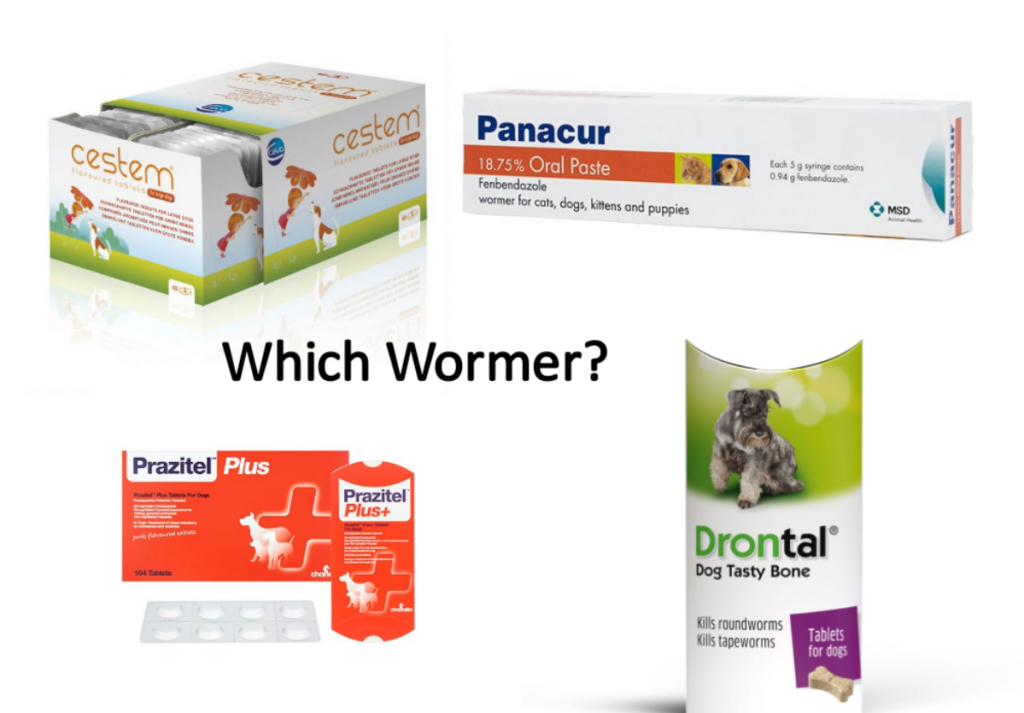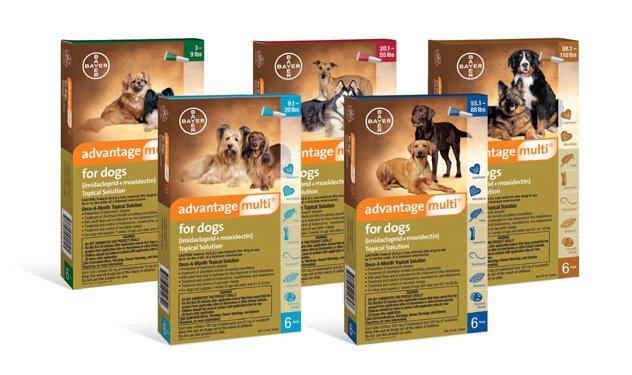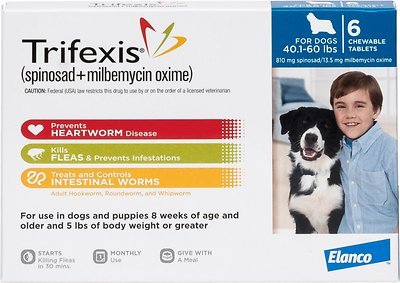Which Wormer?
Which Active Ingredients are in which Wormers?
Wormers often have different active ingredients, so it’s important to know what each active ingredient does.

Here are the top five active ingredients in wormers
Pyrantel Pamoate
A very safe and effective ingredient to treat roundworms, hookworms and pinworms in dogs. Need to dose a second or even third time, two to four weeks apart, to eliminate all stages of the worms.
Roundworms attach to your pet’s intestines with their little teeth. Pyrantel pamoate and works by paralyzing the worms, so they release their grip and pass in the feces. The worms remain alive in the soil for a short period of time.
Piperazine
Effective against two types of roundworms in dogs and cats. For maximum effectiveness, must be administered at least two times (10 to 14 days apart) to the pet.
Fenbendazole
A very broad spectrum anthelmintic (dewormer) used in both small and large animals. In dogs, Fenbendazole is effective against roundworms, hookworms, whipworms,Lungworms and even giardia. Treatment is once a day for three consecutive days. For the control of lungworm in dogs, administer daily for 7 consecutive days.
Fenbendazole works by diminishing the parasites’ energy reserves and limiting their ability to eliminate waste.
Praziquantel
The drug of choice for treating adult tapeworm infections in both dogs and fish. Does not kill the tapeworm eggs, so there is a potential for reinfection. To prevent this from happening, pets should be retreated on a regular basis.
Praziquantel eliminates the tapeworms’ ability to prevent digestion by your pet. Therefore, the tapeworms disintegrate and become absorbed into your pet’s body.
Ivermectin
Most commonly used as a monthly preventative for heartworm in dogs and cats. It is also effective against external parasites such as lice, mange and ear mites. Although Heartworms are not found in the UK. Medications with Ivermectin only work on parasites that your pet has been exposed to in the preceding month, Ivermectin works by interfering with the central nervous system of the heartworm larva.
Caution is advised when using ivermectin with dog breeds that have the MDR1 gene concerns. Studies have shown breeds such as collies, Shelties and breeds that have collie and Sheltie genetics in them, have a higher sensitivity to the effects of ivermectin. For these breeds consider using Bravecto for mange therapy and Sentinel if you don’t feel comfortable giving heartworm medications containing ivermectin.
What is the MDR1 gene?
Multi-Drug Resistance 1 (MDR1) is a gene that is meant for helping to protect the brain. This gene specifically codes for P-glycoprotein, which is responsible for transporting certain drugs out of the brain. If this gene is mutated, it will create a defective protein, and consequently, drugs will remain and build up in the brain to toxic levels. This dominant gene is inherited from the parents, whether the parent has two copies of the gene or only one copy. If neither parent has a copy of the mutated MDR1 gene, then nor will the offspring.
What is the test for MDR1?
You are able to test for the MDR1 gene with either a cheek swab or a blood sample. This can be by ordered through your veterinarian. You will receive a copy of the results indicating if your dog is Normal/Normal, Normal/Mutant, or Mutant/Mutant. If your dog is Normal/Normal, then you don’t have to worry about any drugs related to the MDR1 gene. Dogs with even one copy of the MDR1 gene should be considered sensitive to the drugs indicated in this article.
What breeds are affected?
The most common breed associated with MDR1 mutation is the Collie, but generally, herding breeds are affected, and that includes any mixed breeds you might find at the shelter. Below is a list of breeds that are frequently affected by the MDR1 mutation.
- Australian Shepherd
- Border Collie
- English Shepherd
- Longhaired Whippet
- McNab Shepherd
- Old English Sheepdog
- Shetland Sheepdog
- Silken Windhound
- Rough Collie
- Smooth Collie
- German Shepherd
- American White Shepherd
- English Shepherd
What drugs are not safe?
There are multiple drugs that will affect dogs with the mutated MDR1 gene. As long as your veterinarian is aware of your dog’s MDR1 status, they are able to consider which drugs are best suited for the current treatment. Those with a Normal/Mutant gene may be less susceptible to these drugs, though they would likely react to increased doses. Below is a list of drugs that should be generally avoided in dogs with an MDR1 status, herding breeds or mixed breeds of unknown MDR1 status.
- Ivermectin
- Selamectin
- Milbemycin
- Moxidectin
- Loperamide
- Acepromazine
- Butorphanol
- Vincristine
- Vinblastine
- Doxorubicin
- Paclitaxel
- Apomorphine
The following list is drugs that are known to be removed from the brain via the MDR1 gene, but appear to be safely tolerated by dogs with the mutation.
- Cyclosporin
- Digoxin
- Doxycycline
- Morphine
- Buprenorphine
- Fentanyl
Ivermectin was a catalyst for the first testing of MDR1. The majority of farm dogs are herding breeds, and veterinarians used to give them high doses of injectable Ivermectin as a dewormer because they were highly susceptible to getting worms by being around livestock. With so many dogs showing adverse reactions, farmers and veterinarians looked for a pattern, which is where the adage ‘white feet, don’t treat’ came from.
Now, Ivermectin is still used as a dewormer in heartworm medication, and those that are sold in veterinary clinics have been tested as safe for dogs with the MDR1 mutated gene if used to the manufacturers’ specifications. There are other options for heartworm medication, so Ivermectin doesn’t necessarily need to be used. If your dog is still living near livestock, ensure they are not eating any feces or any discarded dewormer. When livestock are given dewormer, it is a high dose of Ivermectin, and it can remain in the feces (untested to know for how long) for your dog to accidentally ingest. High doses of Ivermectin are still used for treating mange and should be avoided in any MDR1 status dogs.
A common misconception is that MDR1 status dogs are affected by metronidazole, but that is inaccurate because it is not transported by P-glycoprotein. Also, vaccines do not cause any reactions related to the MDR1 gene. Any reactions to a vaccine are due to other reasons, such as allergy or the type of vaccine used.
What clinical signs should I watch for?
When there has been a buildup of toxins in the brain, your dog will start to show neurological symptoms, such as weakness, lethargy, ataxia, disorientation, tremors, seizures, blindness, and death. When any of these symptoms occur, call your veterinarian immediately. Certain drugs have reversal agents, but others don’t, and only supportive care can be given (IV fluids, nutritional support, and diligent monitoring). Recovery can take a long time due to the nature of the toxins remaining in the brain.
Seizures from the MDR1 mutation have no relation to epilepsy. Some herding breeds are prone to epilepsy, which is very different from seizures brought on by a buildup of toxins. It is possible for a dog to have both issues and an MDR1-induced seizure could trigger an epileptic seizure. An MDR1 seizure will always closely follow the administration of one of the drugs listed above.
What should I ask my breeder?
If you are looking to adopt one of the breeds listed above or a mixed breed that appears to have any mixture of the above breeds, see if the breeder has had the puppy or parents tested. A dog only needs to be tested once in its life as its DNA won’t change.
Breeders should give preference to breeding dogs with Normal/Normal MDR1 status, but simply removing all those that are not Normal/Normal would likely deplete the breeding stock too much. If there were not enough dogs to contribute to the gene pool then new genetic diseases or other health issues would become predominant, instead. Therefore, breeders should consider the mutation a fault like any other and weigh it against the other pros and cons of breeding any particular dog.
If your breeder has completed the testing on either the puppy or the parents, please be sure you have a copy of the results to give to your veterinarian so they can be treated appropriately. If the puppy has been purchased for breeding, MDR1 testing should be considered as important as any other test for that breed.
Discussing MDR1 with your veterinarian.
Any veterinarian practice that you bring your dog to ensure the veterinarian knows its MDR1 status. Your veterinarian is the one who should know which drugs are safe and which are not so that they can make an appropriate plan whenever your dog needs treatment. Their status can also be taken into account if any neurological signs appear so that the veterinarian can give a correct diagnosis.
If you don’t yet know the MDR1 status of your dog, your veterinarian can also help with the testing. If you go through a veterinary clinic to do the testing, the results will always be in their file.
Your veterinarian will be happy to answer any further questions you might have that weren’t answered in this article.
More information on wormers
(USA Based info)

SAFE
Interceptor Flavor Tabs (milbemycin oxime)
Interceptor, which comes in a monthly chewable form, has been specifically tested and approved for dogs with MDR1. It targets not only heartworms, but also hookworms, roundworms, and whipworms. Additionally, it can also be given to cats and even pregnant or nursing animals.
Interceptor is the go-to heartworm preventive for many Collie parents. Many veterinary clinics keep some in stock for their clients, and it is also available at online stores like 1-800-PET-MEDS or Chewy. (If you order online, keep in mind that the company will first have to contact your veterinarian for a prescription to be issued, which may slightly delay the shipping time.)
According to a thorough study conducted on MDR1-affected dogs, Interceptor and its more affordable generic, MilbeGuard, rank high in ML safety due to their use of the compound called milbemycin oxime. Documented negative reactions were only provoked at higher-than-normal dosages and were comparatively mild, consisting of salivation, ataxia (dilated pupils), and depression.
The amped-up version, Interceptor Plus, also contains praziquantel, which is used to treat tapeworms. However, the safety of Interceptor Plus has not been evaluated for pregnant or lactating dogs, and it is not recommended for cats. Negative reactions such as vomiting, diarrhea, and tremors were only observed at supratherapeutic (higher than recommended) doses. But unless your dogs have had a problem with tapeworms (whose segments are visible to the naked eye in dog’s poo), then the regular Interceptor should be fine.
CAUTION
Heartgard Plus (ivermectin/pyrantel)
Probably the most well-known heartworm medication is Heartgard, which contains Ivermectin. Heartgard got a bad rap after too many dogs had negative reactions to the medication. With complaints rolling in, the company made adjustments to the Ivermectin content in their product, and Heartgard is now advertised to be “safe at the recommended dosage.” But according to Dr. Judy Morgan, “Neurologic side effects are a possibility with Heartgard.”
Also, some veteran Collie breeders and owners have horror stories of even MDR1-clear Collies having adverse reactions to medications containing Ivermectin. These people consider it a bad idea to give any Collie a “harsh” medication such as Heartgard, even if a genetic test reveals a dog to be normal/normal (clear) of the MDR1 gene. I follow this advice, since I’m a safe-is-better-than-sorry person. The Whole Dog Journal notes that “Ivermectin has the most potential for toxicity.”
There are other risks involving Ivermectin. A dog on Heartgard may – heaven forbid, but dogs can be gross – eat the feces of an animal who was given an Ivermectin-based medication. Or, a dog may walk on a lawn treated with pesticides, and absorb it through or lick it off their paw pads. For dogs who have a case of mange or ear mites, the treatment can involve topical applications of compounds containing (you guessed it) Ivermectin.
Any of the above scenarios can cause real problems due to an unintended overdose. The bottom line is, it’s best to avoid giving your Collie Heartgard or a similar medication. Unless you’re, say, an expat living in China, you can definitely find a better option.
Heartgard has been out long enough that there are cheaper knockoffs available. These generics include Tri-Heart Plus, Iverhart Plus, and Nuheart. Because of their similarity to Heartgard, I’ve placed them in the same “caution” category. Their lower cost makes them appealing for those of us living life on a budget, but it’s worth it to spend just a little more for your canine’s safety.

Combination Medication (Internal/External Parasites)
The parasite protections that target multiple parasites with just one topical application or administration of a pill are extremely appealing due to their convenience. The drawback of using them is that they generally don’t take care of as large a range of parasites as using two separate medications does.

SAFE
Revolution (selamectin)
Revolution, along with a product called Stronghold, tested safest in clinical trials of heartworm medications. Selamectin is their shared main ingredient. Revolution and Stronghold even tested safe over the recommended monthly dosage for dogs with the MDR1 gene, and they hold the distinction of being the only heartworm meds that did not produce any negative drug reactions.
Besides safety, Revolution is an attractive option because of its ease of application (topical squeeze-on tube) and versatility in treating heartworm, fleas, dog ticks, sarcoptic mange, and even ear mites. Since I live in Florida, Revolution is not the best choice for me as it only targets the dog tick. Still, if you live in the city and don’t walk your dogs through long grass or woodsy areas, this could be a great choice for you.

SAFE
Sentinel (milbemycin oxime/lufenuron)
Sentinel comes in a chewable pill form and protects against multiple internal parasites (heartworms, whipworms, hookworms, and roundworms) as well as the development of flea eggs. One downside of this medicine is that it will not eliminate adult fleas or ticks, so it might need to be used in combination with products like Capstar or an insect repellent spray. (More on those later.)
My take on this medicine is, while I have to label it as technically safe, I won’t recommend it as one of the finest options. Based on its limited coverage of external parasites, cautionary potential side effects label, and its non-endorsement for pregnant or nursing females, I decided I could do better for my dogs.
CAUTION
Advantage Multi (moxidectin/imidacloprid)
Advantage Multi is a spot-on treatment that targets heartworm, whipworm, roundworm, hookworm, and adult fleas. Additionally, it can be used to treat and control sarcoptic mange. Moxidectin, the heartworm-fighting portion of Advantage, is considered safe if the proper dosage is given monthly, but it did not test as well as either selamectin or milbemycin oxime in clinical trials, though it ranks above Ivermectin.
Studies have shown that the way an ML (macrocyclic lactone) is administered to an MDR1-positve dog makes a drastic difference in how it affects them. For instance, some ML’s are best tolerated when orally ingested, which meant that a pill form of that particular compound was developed; but moxidectin was just the opposite.
Advantage Multi, which combines imidacloprid for flea control with moxidectin for heartworm prevention, was found to cause no side effects when applied topically to affected dogs even at 5 times the recommended dose, but ingesting less than half the recommended topical dose caused extreme toxicity leading to coma in four of five dogs.”
If you choose to use Advantage Multi, great care should be taken to only apply the liquid between your dog’s neck and shoulder blades, where it cannot be reached by licking. Children should be kept away from the dog for 2 hours until the liquid has had time to dry, and be sure to wash your hands after application. If you have more than one dog and they engage in mutual grooming, you should probably pick a different parasite preventive.

CAUTION
Trifexis (milbemycin oxime/spinosad)
Trifexis is perhaps the most well-known (and frequently peddled at veterinary clinics) of this combo category. It is easily administered since it is a flavored chewable, and it takes care of heartworms and fleas. On the down side, it does not cover any ticks. If you’re someone who lives in a tick-prone area or likes to take your dogs on woodland rambles (like me), this is a letdown.
According to the product description, side effects as a result of Trifexis are rare, but can be as severe as seizures or even a coma. While a study conducted on twenty MDR1-affected Collies did not reveal any adverse reactions when the dogs were given low doses of Milbemycin Oxime combined with Spinosad, the Washington State University of Veterinary Medicine does advise that “some of the combination flea+heartworm preventive products (those containing spinosad) should be used cautiously in dogs that are MDR1 mutant/normal because of a risk of serious drug-drug interactions.”
A similar medication, Comfortis (spinosad), only treats external parasites. But I’ve given it a “caution” designation as it should not be given in combination with heartworm meds and is not safe for dogs who are at risk for seizures.

